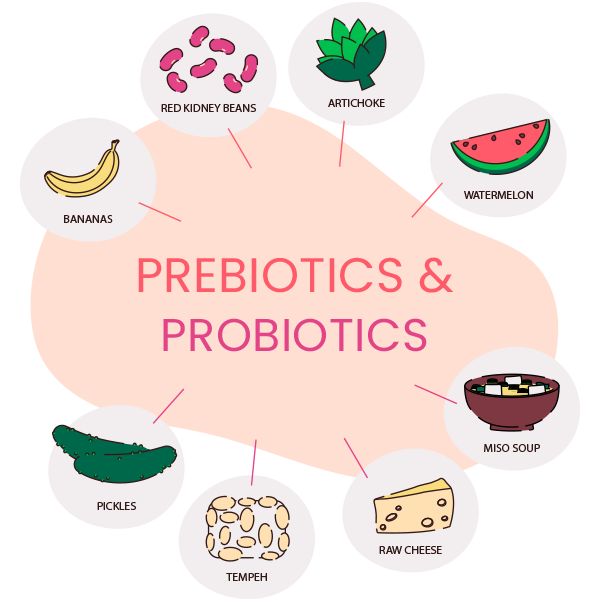
Here on our site, we discuss the importance of maintaining good gut health and the many advantages of eating probiotic-rich foods. If you’re a health nut or just want to feel better all around, you should know that your gut health is crucial. This article will explain how adding probiotics to your diet can make even the most boring meals exciting, and it will also list 10 warning signs that you may be making poor dietary choices. Get yourself a cup of tea and prepare to learn how probiotics may improve your digestive health.
Gut-friendly fare
The adage “you are what you eat” couldn’t be truer when it comes to keeping a healthy digestive tract. The intricate microbial population that calls your digestive tract home is called your gut microbiome, and it depends on the foods you eat to thrive. What, therefore, are the precise dietary requirements for gut health?
Fiber-rich foods should be prioritised first and foremost. Fruits, veggies, whole grains, beans, and nuts all fall within this category. Fibre provides sustenance for the good bacteria already present in your digestive tract, allowing them to multiply and execute their work more efficiently.
A healthy gut diet also includes fermented foods. Live cultures of healthy bacteria, known as probiotics, are found in foods including yoghurt, kefir, sauerkraut, kimchi, and kombucha. These probiotics restore health to the digestive system by outnumbering and starving pathogenic microorganisms.
Prebiotic-rich meals should not be overlooked either. Prebiotics are fibres that your body cannot digest but which provide food for the good bacteria already present in your colon. Onions, garlic, leeks, asparagus and bananas all fall under this category.
The variety and makeup of your gut microbiota might be badly affected by eating too many processed meals rich in sugar and harmful fats.
Making deliberate decisions about what and how much to eat may have a profound effect on our physical and mental well-being. Our health is greatly influenced by the food choices we make. While it’s important to nourish our bodies with nutritious meals, it’s equally crucial to steer clear of unhealthy food options. Here are 10 signs that can help you identify an unhealthy food:
10 sign of an unhealthy food
Foods with excessive amounts of added sugars can contribute to various health issues such as obesity, diabetes, and heart disease.
Foods containing trans fats have been linked to increased inflammation and a higher risk of heart disease.
Look out for foods that contain artificial colors, flavors, and preservatives as they may negatively impact your overall well-being.
Processed foods often lack essential nutrients while being loaded with unhealthy additives like sodium and refined grains.
Consuming too much sodium can lead to high blood pressure and other cardiovascular problems.
A diet low in fiber can result in digestive issues like constipation and also increase the risk of chronic diseases.
Foods rich in saturated fats or hydrogenated oils should be limited as they raise cholesterol levels and promote inflammation.
Opt for nutrient-dense foods instead of those that provide empty calories without offering any significant nutritional value.
Some studies suggest potential risks associated with consuming genetically modified foods, so it's best to choose non-GMO options when possible.
Assess the overall nutritional content of a food item - if it lacks essential vitamins, minerals, or protein but is high in unhealthy components like sugar or saturated fat, it may not be a healthy choice.
Benefits of Probiotics in Meals
Probiotics have gained significant attention in recent years for their potential health benefits. These beneficial bacteria can be found naturally in certain foods and also consumed through supplements. Incorporating probiotics into your meals can have a positive impact on your overall well-being.
One major benefit of including probiotics in your meals is improved digestive health. Probiotics help maintain a healthy balance of gut bacteria, which is essential for proper digestion and nutrient absorption. They can alleviate symptoms of common digestive issues such as bloating, constipation, and diarrhea.
In addition to promoting good digestion, probiotics also support a strong immune system. The majority of our immune cells reside in the gut, so maintaining a healthy gut flora is crucial for optimal immune function. Probiotics stimulate the production of antibodies and enhance the activity of immune cells, helping to defend against harmful pathogens.
Another advantage of consuming probiotics is their potential to improve mental health. Research has confirmed that there is a connection between the gut microbiome and mental well-being. Probiotics influence neurotransmitter production and reduce inflammation in the brain, potentially alleviating symptoms of anxiety and depression.
Furthermore, incorporating probiotic-rich foods into your diet can aid in weight management. Certain strains of probiotics have been shown to help regulate appetite hormones and increase satiety after meals since it helps in better digestion and absorption of food. This can lead to reduced calorie intake and promote weight loss or maintenance.
Adding probiotic-rich foods like yogurt, sauerkraut, kefir, or kimchi to your meals can offer numerous benefits for both physical and mental health. However it’s important to note that not all strains or brands are created equal; consulting with a healthcare professional or registered dietitian before starting any new supplement regimen is always recommended.


